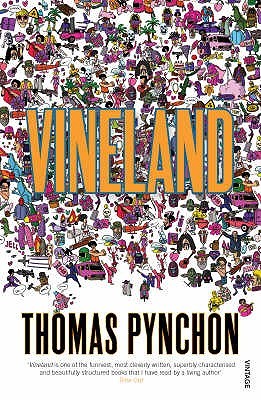Thomas Pynchon has been living out of the public eye for almost four decades now, a literary hermit who has succeeded by his very reclusiveness in attracting more attention than his less retiring colleagues. Seventeen years ago, his novel Gravity’s Rainbow elevated Pynchon to cult-hero status, and ever since his acolytes have eagerly awaited a new blockbuster from their master. His new novel, Vineland, isn’t quite it, but it offers an appropriately millenarian opening chord for the literature of the 1990’s.
Vineland, the name the Vikings gave their version of North America a thousand years ago, is Pynchon’s new world: the forested coast of northern California, where a generation of refugees from the 60’s have settled to grow marijuana, live free or at least untroubled by reality, and die. One of them, protagonist Zoyd Wheeler, is the hippie Everyman, a drug-hazed veteran of the Free Speech Movement and the Haight, who lives from one federal disability check to the next, the only requirement for such support being that he commit one “publicly crazy” act each year, in full view of the dispossessed lumberjacks, hermits, punks, dopers, narcs, and yuppies who inhabit Zoyd’s once-isolated world.
As the novel opens, Zoyd learns that his subsidy is being cut, for this is 1984 and Reaganomics is in full tilt. To add insult to fiscal injury, Zoyd’s teenaged daughter Prairie has just announced her intention of moving in with her be-mohawked boyfriend, a singer in a thrash-and-smash rock band and author of the feminist anthem, “I’m just a Floozie with an Uzi.” Bent on finding herself, Prairie (in Vineland only the house pets have normal names) is just as intent on learning about her ethereal mother’s past, for of his ex-wife, Frenesi, Zoyd has remarked only that during their time together he “felt like Mildred Pierce’s husband.” Prairie’s latter-day “Telemachia” occupies much of the interior of Pynchon’s novel, and the journey is a parody of a long, strange trip any Woodstock child would recognize, replete with Vietnam veterans with such names as Blood and Vato, with the infantile society of the 1980’s and its wacked-out denizens.
Frenesi, Prairie learns, had long been an unwilling informant for the FBI during the antiwar years, controlled by one Brock Vond, now the district commissar for the Drug Enforcement Agency and resident nemesis of the local dopers. Like Zoyd, Frenesi has drifted through two decades without a mooring cable, flitting from one pop fad, one designer drug, to another; only when Prairie reaches toward her does she begin to assume something of the humanity that abandoned the wild shores of Vineland years before. But Frenesi’s transformation is too little too late, as Vineland rockets along to its nicely twisted ending: a far more neatly arranged close than that of Gravity’s Rainbow, which literally (and literarily) disintegrated. Readers who reach the end of Vineland, having exerted the effort that Pynchon requires, will be surprised only by the ultimate conventionality of the story that led them there.
One of Pynchon’s better conceits in his dystopian novel is the “thanatoid syndrome,” whose willing victims exist in a state “like death but not quite dead.” These Thanatoids, who inhabit the greater mass of America, make inroads into Vineland throughout the book, glued to the television, abhorring radical, liberal, conservative, any independent thought and all who engage in it, sating themselves on Rabelaisian TV-dinner banquets and their narcoleptic denouements.
Vineland is minor Pynchon. Certainly it does not approach the jittery japery of Gravity’s Rainbow or the mysteries of V, his first novel; in many ways, thematic and rhetorical, it resembles his quickie fable The Crying of Lot 49. But it is of a piece with all those books, extending a vision now grim, now comic, always parodistic, careening from style to style, wearing its influences proudly, never concerned with what the neighbors will think. It is minor Pynchon, but Vineland is well worth the attention of readers.
[Vineland, by Thomas Pynchon (Boston: Little, Brown and Company) 383 pp., $19.95]

Leave a Reply